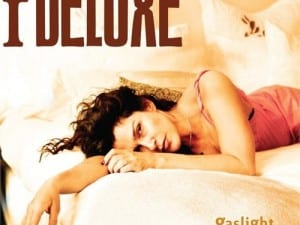The past five years have seen the evolution of the music video, resulting in stronger and stranger narratives than ever before.
It was 16 February 2008, and Kelly Rosenthal had just uploaded her first video to YouTube. Dressed in ripped jeans, with eyes lowered under a yellow Ed Hardy cap, Rosenthal strummed along to Blackbird by The Beatles. The California teenager, who had only just learned to play guitar, was recorded by her sister, who uploaded the video.
Predictably, it attracted its fair share of comments, ranging from “Excellent playing. Very smooth and in time. Keep up the good work!” to the somewhat predictable “I have SUCH an erection right now” (Rosenthal was, we should point out, 16 at the time). Today, her Beatles video is sitting at over 227,000 views. Her own channel has gathered 16 million views and just under 70,000 subscribers. Her band, Say Chance, can add over 700,000 more views.
But the viewing figures aren’t the point – not really. There’s no way to pinpoint the exact moment when online music videos became more powerful than their television counterparts, but we’d like to nominate Rosenthal’s Blackbird. Video killed the radio star, and Kelly Rosenthal killed video.
Let’s simplify this to a conversation about MTV and YouTube. The former is the old-world gatekeeper for the planet’s music videos. The latter is the only online video service worth talking about. In 2011, YouTube scored over 1 trillion views. Comparing that to television music video figures is hard, but let’s try this: MTV’s biggest night in that year was the Video Music Awards, for which they recorded a solid 12.4 million viewers. But MTV could have had figures like that every single night of the year, and wouldn’t have hit half of YouTube’s figures. This is not a battle they can win anymore.
That YouTube has beaten MTV at the video game is not new, or even relevant. What’s relevant is the way in which these videos have changed. They’ve evolved. They’ve become quicker. Grown thicker scales and sharper claws. And these aren’t the lumbering Tyrannosaurus Rexes and Diplodocuses of five years ago; these are tiny little reptiles, swarming over the old media companies, biting and chewing and slashing. MTV has tried to survive by switching the focus to bespoke shows and reality TV, but it’s only delayed the inevitable.
For starters, gone are the high-budget, single-driven, flashy videos. The ones most likely to launch the careers of young musicians now aren’t even their own material. Cover versions, or interpretations of pop culture material, are among the most successful videos on YouTube. Part of this, Rosenthal says, is because these videos help pull in audiences. “What I’ve noticed is that the videos that are most successful on YouTube are where people take something that has usually been done before, and do it in a more relevant or interesting way,” she says. “The videos that have been most successful of mine have literally been me playing other people’s stuff the way they played it, but with a little of my own style. What’s important for me as an artist is for people to gravitate towards what I do. It’s important to open the door in some way, and sometimes that’s about playing other people’s stuff. Then you can lead them into what you do – if they’ve seen you before, they’ll come and find your own stuff.”
Secondly, everything moves at light-speed – again, hardly news, but certainly important. UK rapper Dan Bull has become almost absurdly well-known online, mostly for his genius videogame-themed raps and often hysterical takes on current events. In 2009, he recorded a musical letter to Lily Allen, mocking her claim to be an independent artist. (“Faking it like you were all alone, but you were legally with Regal, part of Parlophone”)
“I emailed it to two tech bloggers, and went to bed,” he says. “I woke up the next morning, and my email inbox was broken. It was just full of comments. I’d seen nothing like it before. There were journalists trying to contact me. It was crazy!” Imagine that happening when The Real World was still killing the ratings.
We don’t mean to suggest that these are all universally positive developments, or that MTV was the big, bad old giant keeping these talented musicians away from their fans. The new world of music videos comes with its own downsides. Chief among these – and something that could become very problematic long-term – is how online video artists are remembered. Dan Bull already has a couple of albums of very solid rap music to his name, but will he forever be known as “the guy with the videogame raps online?” Can Kelly Rosenthal ever get past her “YouTube success” label?
“That was something I worried about a bit,” says Dan. “But I’ve produced a couple of albums, working on another one. And I think my music is good enough to speak for itself. I don’t really want to sit there worrying about how I’m perceived. I’m just interested in making music.”
Rosenthal echoes this, saying that she’s satisfied that YouTube is a tool, rather than something career-defining: “I’ve used YouTube for something that’s me playing in my living room. It’s excellent that you don’t have to get on the television to reach millions of people. It’s definitely a huge goal for me, but the stuff that I record in my bedroom – that to me is what YouTube is.”
And then, of course, there’s that awfully toxic online environment. YouTube is notorious for having the most vile commenters in the universe. That’s an absolute, by the way: no other site seems to foster more hatred and bile. There’s no real answer as to why this is. But it’s a nasty side to the new world of videos. “You have to recognise [this] going into it,” Rosenthal says. “The Internet is a very wonderful thing, but it’s also a toxic thing. People can hide behind the anonymity of a computer screen. I like to look on the bright side.”
There’s also a credibility issue. Whatever MTV’s failings, it was at least curated. Not every video made it out. But YouTube – which isn’t a democracy so much as a controlled form of anarchy – makes it easy for anyone with a camera to record something. Often something laughably bad. YouTube, for all its trappings of the future, has a credibility problem.
Dan Bull and Kelly Rosenthal aren’t the end result of this paradigm shift, though they’re well on their way. The end result is already here. Her name is Lindsey Stirling, and she’s transcended YouTube to become a musical phenomenon.
A violinist who matched classical playing to dubstep in her videos, she quickly garnered over 208 million views and 1.3 million subscribers, and her first UK show – in January this year – sold out in hours, prompting a second to be hastily scheduled at a much larger venue. Stirling is not only incredibly talented but amazingly attractive, with a pixie-like demeanour and a kinetic body. (You might think these are deeply creepy statements, but if you don’t think that this is part of why her videos are so successful, you’re just being naïve.)
Not that this is Stirling’s fault – after all, it’s hard to see her videos and not be amazed at her prodigious skill. And a classically trained musician breaking into the mainstream is exactly the sort of thing that brings out the best in YouTube. Anybody fussing over how to bring genres like classical and opera to a new audience need only look at what Stirling is doing.
So what’s next for videos? Once YouTube has beaten MTV, where does the form go? Dan Bull thinks the next stage is interactivity: “I’d like to write a song that could branch off in two directions. The first verse would be the same, and the second verse would have option A and option B, and the listener could choose what they want to happen. That’s one of the only directions left for a paradigm shift in video-making.”
For more information on Dan Bull visit youtube.com/douglby and for more on Kelly Rosenthal vist youtube.com/kellyismusical. For further details on Lindsey Stirling visit youtube.com/lindseystomp.
Rob Boffard





